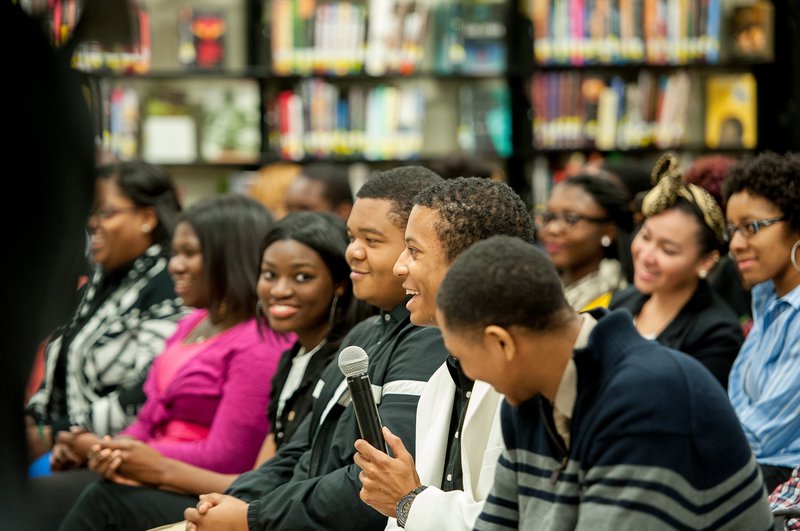COVID and the Class of 2020: Supporting Black Students
Takeaways from Session 5 of the New America / Indianapolis Recorder Series
Blog Post

Flickr Creative Commons
April 24, 2020
On Tuesday April 21, New America Indy and The Indianapolis Recorder continued an online series on the impact of the COVID-19 crisis on the Black Community. In this fourth installment, moderated by New America's Molly Martin and the Recorder's Marshawn Wolley, we were joined by:
- Dr. Danette Howard, Senior Vice President and Chief Strategy Officer - Lumina Foundation
- Dr. Sean Huddleston, President - Martin University
- Mrs. Andrea Neely, Director - Regional Development (Indiana, Michigan) - UNCF
- Ms. Doneisha Posey, Vice President of Diversity, Equity & Belonging - Ivy Tech Community College
- Dr. Ronald S. Rochon, President - University of Southern Indiana
Among the takeaways from our conversation:
- High-quality postsecondary education remains the best pathway to economic stability and mobility. 95% of jobs recovered after the Great Recession went to students with at least some college and a majority of earnings were captured by Bachelors degree-holders (Georgetown CEW).
- Gaps between postsecondary attainment rates for Black and white students persist due to systemic bias and inequitable pathways. "Nationally, 32% of African Americans hold a credential, Associate, or Bachelors degree" versus 48% of whites (Lumina, A Stronger Nation). This leaves "talent on the table," depriving students of opportunities and communities of invaluable contributions.
- Completion for what, though?" Yes, postsecondary attainment is the best pathway to the middle class, but students need to understand how the skills they develop map to future education, career and income opportunities. We can support this by bringing labor market data to life for students, advisors and parents; clearer public conversations about the transferability of skills; and advocacy for stackable credentials. Mrs. Neely reminds us of the importance of guidance and systems that help students complete in two- and four-year timelines.
- Conversations and solution design often neglect to focus on or amplify Black excellence. Dr. Huddleston reminds us to be cautious of using deficit language while also continuing to focus on systems that drive disparate outcomes.
- Black students--like the Black community--are not a monolith. We are serving individual students and must design accordingly. As Ms. Posey and Dr. Rochon emphasized, it is important to prioritize efforts and outreach that fosters a sense of belonging on campuses and ownership of the campus experience.
- In Indiana, as in much of the U.S., Black residents are bearing the brunt of COVID-19 mortality. This means that accessible, affordable, on-campus mental health support for Black students is more important than ever as some students may be grieving.
- The transition away from a residential campus was a particular challenge for students who rely on college campuses and programs for safe housing and food. At the same time, more of today's students--of all races--work more than 20 hours per week, do not live on campus, are parents, and are more likely to have life circumstances disrupt their education (transit access/car trouble, unexpected bills, childcare challenges, responsibilities to help support or care for parents and siblings). Some students live in precarity and, therefore, the additional challenges of navigating a national crisis may more readily compromise their ability to complete a degree. Emergency aid and wraparound supports matter.
- The rapid pivot to increased digital/online learning is, at once, an opportunity to address trauma occurring in some educational environments and a potential challenge. Black households in America are more likely than white households to rely only on a smartphone to connect to the internet. There is also a 13% gap between Black and white households reporting home broadband service. We must address, both, digital access and prioritize accessible design of classroom materials. Additionally, Dr. Howard pointed out that Black student outcomes improve with in-person engagement and instruction in well-designed environments.
You can read the full transcript here.
We look forward to the next conversation and thank our co-hosts, The Indianapolis Recorder, and community partner WFYI Public Broadcasting.


ADDITIONAL RESOURCES:
- UNCF Indy
- Martin University
- USI: DEI
- Lumina Foundation: Racial Equity
- Postsecondary Attainment Gaps: U.S. and States (Lumina)
- Indiana CHE College Equity Report
- Black Student Success and Institutional Performance (Ed Trust)
- The Unequal Race for Good Jobs (Georgetown)
- COVID: "Young Adults Need Targeted Support in Recovery Efforts" (New America)
- COVID: "Black College Students And Staff Make Their Own Safety Net Against COVID-19 Crisis" (LAist)
- Context/background on students of color and the HEA (New America)